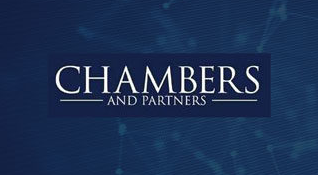Meta-e Discovery Ranked Once Again Among Top eDiscovery Litigation Support Providers by Chambers USA
— CEO and co-founder Paul H. McVoy Ranked in Band 2 Nationwide
June 25, 2020, New York – Meta-e Discovery LLC, a leading eDiscovery services firm, has once again been recognized by Chambers and Partners as one of the top eDiscovery litigation support providers in the United States in the 2020 Chambers Litigation Support Guide.
Meta-e was ranked alongside industry giants as Ernst & Young and KPMG and is one of only 18 eDiscovery litigation support providers recognized and ranked by the prestigious guide. In this year’s edition, the Chambers Litigation Support Guide notes that Meta-e is “roundly praised by the market for their technical strength.” A client says: “They are fantastic. There are so many choices, yet I continue to go with them,” with another saying: “They help us make sure we are putting the process in the correct way, and ensure that when it gets to the back end, it is organized in a logical and coherent way.”
Meta-e CEO and founder Paul H. McVoy has moved up in the band ranking from “recognized practitioner” to Band 2-Nationwide, one of only eight e-Discovery professionals ranked in the country. The Guide notes that Mr. McVoy receives much praise for his expertise in the sector, with one client calling him “a wealth of knowledge,” while another says: “When I have a question, I can either look it up or I can just email Paul and get a response quickly.” The Guide also notes that along with his expertise he is also well recognized as being a pleasure to work with, with one client remarking: “He has a powerful combination – someone who is sophisticated and has seen a lot of what defendants have done to try to hide the ball.”
Mr. McVoy has managed domestic and international eDiscovery projects for both plaintiffs and defendants for almost 20 years. He is an active member of The Sedona Conference® and is editor of the Sedona Glossary, a frequently cited paper that is widely used to define eDiscovery terms. He has directed preservation, collection, and review in high-profile merger investigations. He has also been an influential consultant on many high-profile cases, including Target Data Breach, BP Oil Spill and the Flint Water Contamination case.
Chambers and Partners also ranks leading eDiscovery lawyers in the United States. Meta-e co-founder and business strategist Ariana J. Tadler, a partner at Tadler Law LLP, has also been ranked among the top eDiscovery lawyers in its USA-nationwide and Global rankings, earning a Band 1 category.
Based in New York and Connecticut, Meta-e Discovery has handled eDiscovery for a variety of litigation matters ranging from the largest class actions and complex litigation to individual commercial disputes. It is widely known for offering scalable eDiscovery technology and litigation support to clients of all sizes, from pre-case planning and budgeting to document review and depositions.
To learn more about Meta-e Discovery and what we do visit us at www.metaediscovery.com or contact us by email at info@metaediscovery.com or by calling 203-544-8323.



